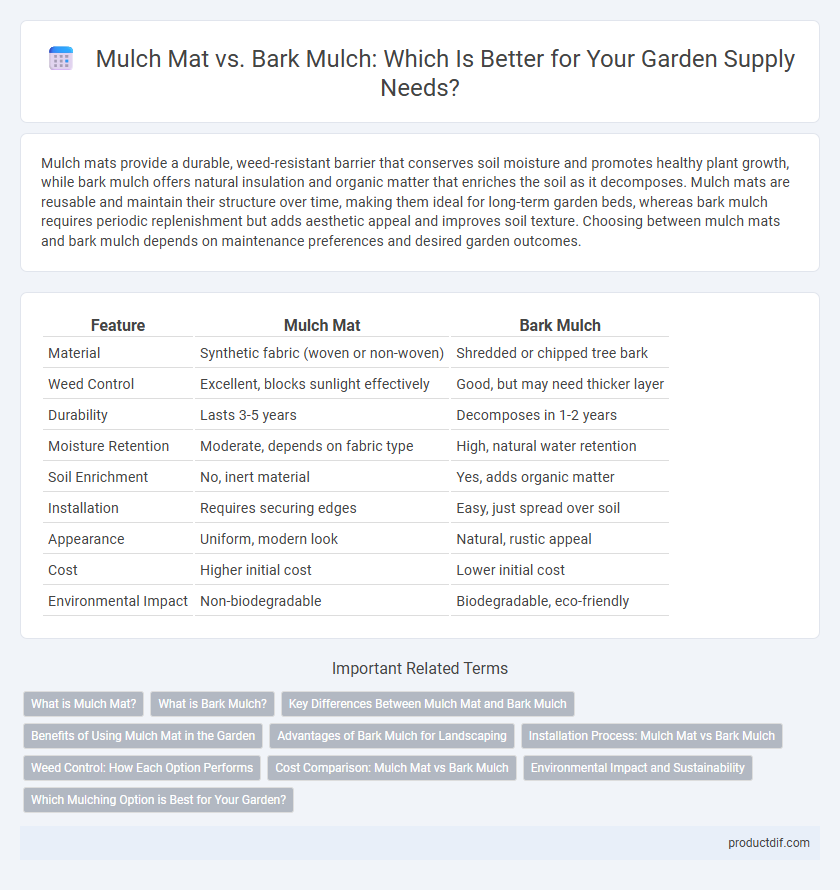Mulch mats provide a durable, weed-resistant barrier that conserves soil moisture and promotes healthy plant growth, while bark mulch offers natural insulation and organic matter that enriches the soil as it decomposes. Mulch mats are reusable and maintain their structure over time, making them ideal for long-term garden beds, whereas bark mulch requires periodic replenishment but adds aesthetic appeal and improves soil texture. Choosing between mulch mats and bark mulch depends on maintenance preferences and desired garden outcomes.
Table of Comparison
| Feature | Mulch Mat | Bark Mulch |
|---|---|---|
| Material | Synthetic fabric (woven or non-woven) | Shredded or chipped tree bark |
| Weed Control | Excellent, blocks sunlight effectively | Good, but may need thicker layer |
| Durability | Lasts 3-5 years | Decomposes in 1-2 years |
| Moisture Retention | Moderate, depends on fabric type | High, natural water retention |
| Soil Enrichment | No, inert material | Yes, adds organic matter |
| Installation | Requires securing edges | Easy, just spread over soil |
| Appearance | Uniform, modern look | Natural, rustic appeal |
| Cost | Higher initial cost | Lower initial cost |
| Environmental Impact | Non-biodegradable | Biodegradable, eco-friendly |
What is Mulch Mat?
Mulch mat is a synthetic ground cover designed to suppress weed growth and retain soil moisture, typically made from durable, weather-resistant materials like polypropylene or recycled fabrics. Unlike bark mulch, which is organic and made from shredded tree bark, mulch mats provide a long-lasting barrier that requires less frequent replacement. Mulch mats are ideal for gardens and landscapes needing effective weed control, soil protection, and reduced maintenance.
What is Bark Mulch?
Bark mulch is a natural garden supply made from shredded or chipped tree bark, typically sourced from cedar, pine, or hardwood trees. It serves to retain soil moisture, regulate temperature, and suppress weed growth while gradually decomposing to enrich soil with organic matter. Unlike synthetic mulch mats, bark mulch offers a biodegradable option that enhances soil health and supports sustainable gardening practices.
Key Differences Between Mulch Mat and Bark Mulch
Mulch mats are synthetic, designed to suppress weeds and retain soil moisture through a breathable fabric, whereas bark mulch consists of organic wood chips that decompose over time, enriching soil nutrients. Mulch mats provide longer-lasting weed control without decomposition, while bark mulch requires periodic replacement but enhances soil health. Choosing between the two depends on whether you prioritize low maintenance and durability or natural soil improvement.
Benefits of Using Mulch Mat in the Garden
Mulch mats provide superior weed control by creating a durable barrier that prevents sunlight from reaching weed seeds, reducing maintenance efforts in the garden. They enhance soil moisture retention more effectively than bark mulch, leading to healthier plant roots and reduced watering needs. Additionally, mulch mats resist decomposition longer, offering long-term protection and soil temperature regulation throughout the growing season.
Advantages of Bark Mulch for Landscaping
Bark mulch offers superior moisture retention and improves soil fertility by decomposing slowly and releasing essential nutrients, promoting healthier plant growth. Its natural appearance enhances garden aesthetics by providing a rich, textured layer that suppresses weed growth effectively. Compared to mulch mats, bark mulch is more environmentally friendly and easier to apply over irregular garden beds and slopes.
Installation Process: Mulch Mat vs Bark Mulch
Mulch mats offer a streamlined installation process as they come in pre-cut sheets that can be easily laid out and secured around plants, reducing preparation time and minimizing soil disturbance. Bark mulch requires manual spreading and leveling, which can be labor-intensive and may need frequent replenishing to maintain an effective coverage layer. Choosing mulch mats can improve efficiency in garden maintenance, particularly in large-scale landscaping projects.
Weed Control: How Each Option Performs
Mulch mats create a physical barrier that effectively suppresses weed growth by blocking sunlight, reducing the need for frequent weeding. Bark mulch, while also helping to control weeds, allows for some light penetration and may require occasional maintenance to prevent weed seeds from taking root. Both options improve soil moisture retention, but mulch mats provide more consistent weed control in garden beds and landscaping areas.
Cost Comparison: Mulch Mat vs Bark Mulch
Mulch mats generally have a higher initial cost compared to bark mulch due to their durable, fabric-based composition designed for long-term use. Bark mulch is more budget-friendly upfront but may require frequent replenishing, increasing overall expenses over time. For cost efficiency, consider mulch mats for extended use and bark mulch for shorter-term, lower initial investment needs.
Environmental Impact and Sustainability
Mulch mats, made from recycled rubber or biodegradable materials, offer a longer lifespan and reduce the need for frequent replacement compared to bark mulch, which decomposes faster and requires replenishment. Bark mulch, derived from tree bark, naturally enriches soil as it breaks down but may contribute to deforestation if sourced unsustainably. Choosing mulch mats made from recycled content supports waste reduction, while sustainably harvested bark mulch supports soil health with a lower carbon footprint when responsibly managed.
Which Mulching Option is Best for Your Garden?
Mulch mats provide superior weed suppression and moisture retention by forming a stable barrier that reduces soil erosion and promotes healthy root development, ideal for long-term garden maintenance. Bark mulch offers natural aesthetics and nutrient-rich decomposition that improves soil quality while attracting beneficial microorganisms, making it suitable for organic gardening. Choose mulch mats for durability and efficiency or bark mulch for ecological benefits and soil enrichment depending on your garden's specific needs.
Mulch Mat vs Bark Mulch Infographic

 productdif.com
productdif.com